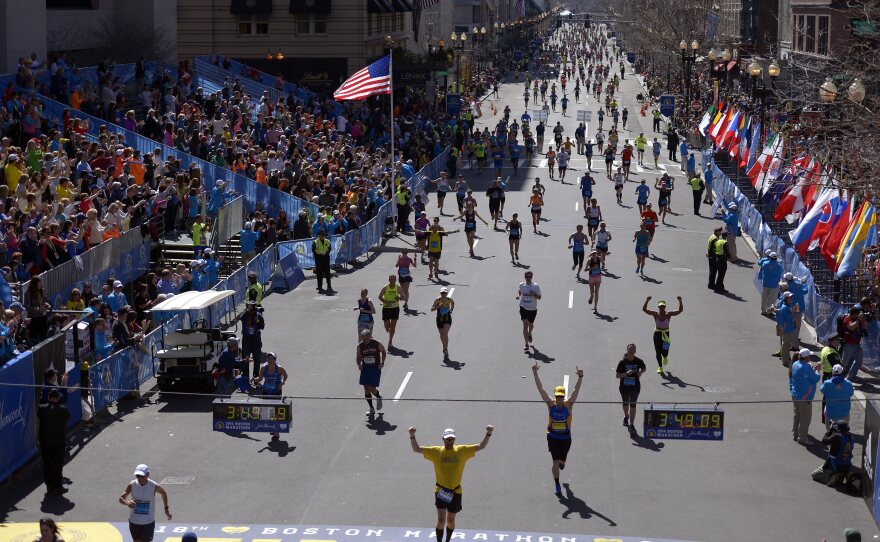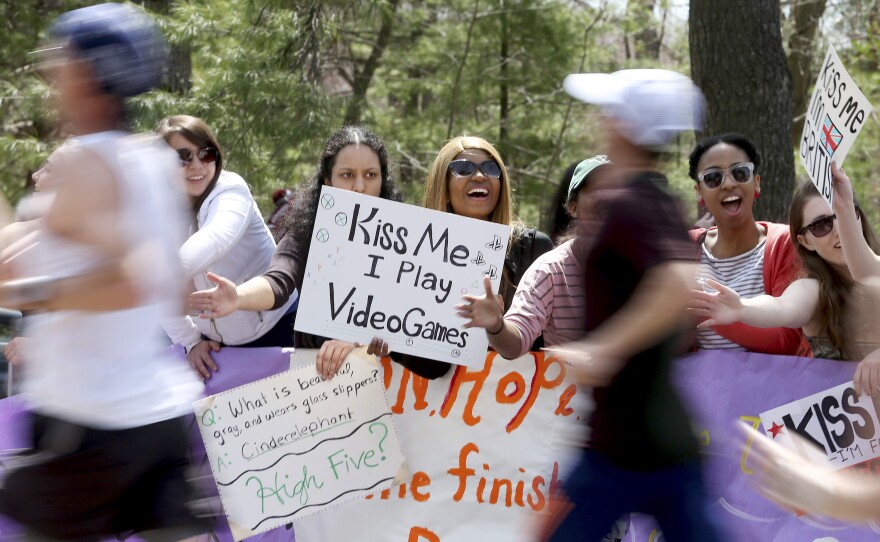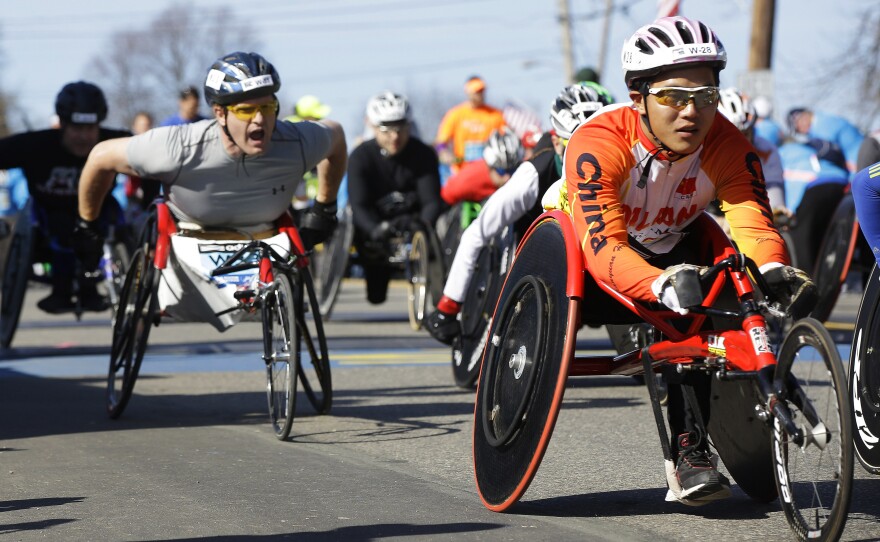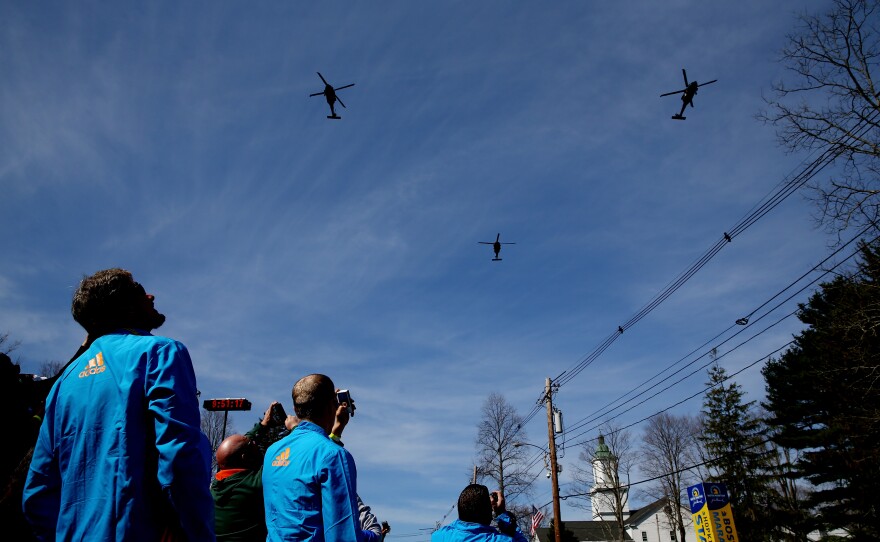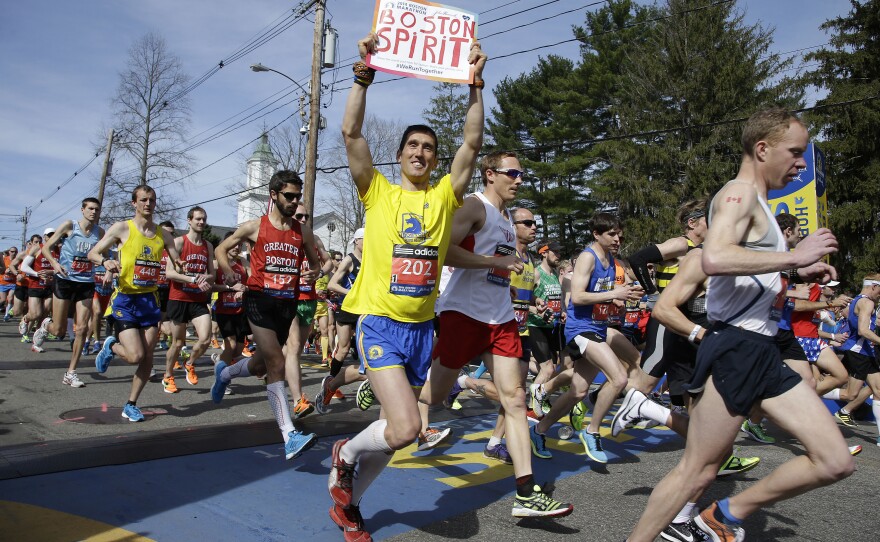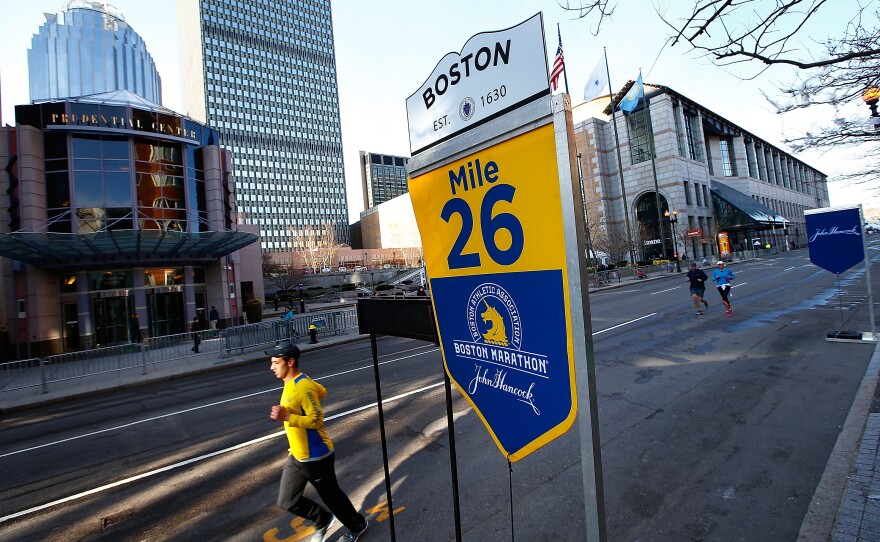There is no doubt the bombings of last year cast a long shadow on the 118th running of the Boston Marathon.
It was an inevitable backdrop: The signs on the buildings that line the course near the finish are usually covered in witty, encouraging posters. This year, they encouraged a greater kind of perseverance.
"Boston Strong," they exhorted.
And the crowd gathered at the finish line on Boylston Street had reason to cheer and celebrate Monday, as American Meb Keflezighi ended a 31-year drought for U.S. men in the Boston Marathon.
It was an emotional scene for the crowd and the runner, who broke the tape near a small makeshift memorial to those who died after last year's attack on the race's finish line.
Holding his trophy as the U.S. national anthem played, tears streamed down Keflezighi's face.
Race day has brought a feeling of celebration to a city that sorely needed it. This is New England's biggest sporting event, after all, and the world's oldest and most prestigious 26.2-mile road race.
The day was marked by music and laughter, and Mother Nature — with its daffodils and tulips and glorious yellow willows — also joined in.
As historian Tom Derderian told us, after the bombings, the Boston Marathon became about runners and spectators "putting themselves at risk in defiance" of terrorism.
Throughout the day, we brought you vignettes from key points on the course: Hopkinton, Wellesley, Heartbreak Hill and the finish line. Read on for a more detailed look at the race.

Mile 0: Hopkinton
The morning started with a moment of silence.
Most of the 36,000 athletes who will run the Boston Marathon this year gathered at the field of a high school in Hopkinton, Mass. They put out blankets and sat in the sun to warm themselves. In their countenances, you could see a mix of nerves and excitement that translated into the hum of a village.
But when the race emcee began to recite the names of the four people who died because of the attacks on Boston last year over the speakers, everything settled.
"Martin W. Richard, Krystle M. Campbell, Lingzi Lu, Officer Sean A. Collier," the emcee said.
By the time he finished, the shuffling had stopped and all you could hear was the low buzz of helicopters flying high above.
Much like last year, the day started off perfect for a marathon — chilly, with high, thin clouds shielding some of the sun.
But unlike last year, security was more intense. Uniformed officers and National Guard troops were stationed on every street. Runners were screened before they boarded buses. Every bag was checked, and state police officers boarded buses to take a second look.
Like last year, however, the small community poured out onto the streets.
Bob and Liz Burke moved to Hopkinton just after they got married more than 20 years ago. Their kids are now in high school, and they've come to see the beginning of the world's oldest marathon pretty much every year.
Today, the Burkes were on a hill overlooking the starting line. They could see the elite runners — sinewy and wearing single digits on their race bibs — trotting up and down the race course to warm up.
This year, said Bob, it's a little different.
"There's a little bit of everything going on," he said. There's sadness and joy and celebration.
"I think people very much want to reclaim that sense of normalcy, yet at the same time [the bombing] is the elephant in the room," he said.
As we talked, the sound of the starting pistol pierced the morning air. The fastest women in the world were off for their 26.2-mile sprint. The men would follow. And after every blast from the pistol, the crowd roared.
-- Eyder Peralta

Mile 13: Wellesley
The "Scream Tunnel" arrives for runners fast and runners slow at the 20-kilometer mark on a normally quiet, tree-lined stretch of Central Street that flows past Wellesley College. Most of the school's 2,300 students cheer on the runners with an abandon that can only be ascribed to youth.
Oh, and they do more than hoop and holler; they also offer encouragement with their lips.
The "Scream Tunnel" might just as well have been named the "Kissing Tunnel," because the Wellesley tradition is to offer smooches along with raucous cheers as runners stream by. The elite competitors just smile at the girls and fly by. But farther back in the pack, there are plenty of takers willing to slow down for a little sugar on the run.
"Some people barely ease up and just lay a drive-by kiss on your cheek," says student Sabrina D'Souza. "Some are careful, plant it right on the lips and take a photo to remember the moment."
D'Souza planted herself at the 20-kilometer mark to "catch the runners early" for initiation into a "fun and joyful Wellesley tradition."
This year means more than most, however, as evidenced by the signs along the course. Last year, students at the college produced about 250 colorful posters of encouragement. This year the number is more like 800.
Holding reams of freshly prepared posters for the race, Sravanti Tekumalla and Erin Altenhof agree that Marathon Monday is the only day of the year when Wellesley feels "like a real college." It's today, they say, that the normally studious community cuts loose in a way that just doesn't happen any other time of the year.
While the screams rolled down Central Street in continuous waves, past the college and into the town of Wellesley, where generations of fans gathered along barricades and did their best to match the girls voice for voice, one couldn't help but notice security personnel everywhere. The Wellesley police were out, as you would expect. But military police and what appeared to be undercover or plainclothes police were evident all along the route. Military helicopters flew overhead.
The increased security, however, did nothing to dampen Wellesley's spirits. Dacie Boyce says this is always the best day of the school year — an inspirational event. Everyone says this year's race is even more so.
The memory of last year "amps up the feelings we already had, like, 10 times" says Boyce — as the deafening noise of Wellesley's Scream Tunnel greets another lucky runner who is now almost halfway home to the finish in Boston.
-- Wright Bryan

The Elites
In the men's field of the 118th Boston Marathon, American Meb Keflezighi ended a 31-year drought for U.S. runners after staying ahead of Wilson Chebet of Kenya in a race that came down to the final mile. Keflezighi finished with a time of 2:08:37.
According to race officials, Keflezighi ran a 4:56 split at mile 23, when he had built a 20-second lead. His lead dwindled near the end, but Keflezighi stayed well ahead of his nearest competitor, as Chebet finished with a time of 2:08:48.
The crowd roared as Keflezighi crossed the finish line, celebrating a much-needed victory in the historic race.
"If somebody beat me," Keflezighi recalls thinking, "I'm going to inspire others to do it."
No American had finished first in the men's division since Gregory Meyer won in 1983. The last American woman to win was Lisa Larsen Weidenbach in 1985.
The women's field was won by Rita Jeptoo of Kenya, who set a course record with a time of 2:18:57 as she successfully defended her title as the Boston champion.
American Shalane Flanagan, a Massachusetts native, finished sixth in the race, posting a personal best with her time of 2:22:01. Michigan's Desiree Linden rounded out the women's top 10 with a time of 2:23:54.
For the second year in a row, Tatyana McFadden of Illinois won the women's wheelchair race. She posted a time of 1:35:06.
In the men's field, three-time top-five finisher Ryan Hall, a California native who trains in Arizona (and, more recently, in Ethiopia), fell off the leaders' pace and finished with a time of 2:17:50.
-- Bill Chappell
Mile 20: Heartbreak Hill
Watching people watch the marathon is an event itself. Nowhere is this more evident than in Newton, home to Heartbreak Hill. The nickname for this stretch of road comes from 1936, when defending champion Johnny A. Kelley lost his race here.
At mile 20 stands Dave Evangelista, cheering, clapping and calling out friendly encouragement each time someone runs by with their name pinned to their shirt. A former marathoner himself, Evangelista says he picked this spot because "it's the place folks need the most support."
Looking out on the course, all can seem serene. There's actually a gentle downhill here. But that belies the fact that runners who make it this far have already had their fill of a series of hills leading up to this one. Heartbreak Hill is within spitting distance of the 20-mile mark, when many athletes start to lose energy. And it has to be conquered if a runner wants to make it to Boylston Street and the finish in downtown Boston.
The people passing all have their own unique style. Some walk; others glide by. Some jerk with every step forward but show no sign of tiring. Others look like they'll give up any moment now. And then there are the runners who look like they're out for a quick spin around the neighborhood, not like they're kicking through mile 20 of a marathon.
Evangelista, who says he's run in three Bostons and watched about 10, drops this wisdom as the diverse crowd slides by: "You just have to accept that someone who doesn't look anything like the runner you are is going to blow by you."
With the sun feeling warmer than the indicated 57 degrees, the whole neighborhood has turned out to watch the runners go up the hill. The athletes' pace slows, with many who were jogging now walking. But the energy on the sidelines is revving up.
Families have put up tents, laid out blankets and taken up the challenge of motivating the runners to make the summit. Cheers are loud and whole groups chant the names of individual runners going by. Cow bells ring out urgently here and there. Many groups on the sideline are wearing Boston Strong T-shirts.
Military and police shadow the whole scene, quietly standing by — and watching — at regular intervals on the course.
Near the top of the hill, the manic rhythms of the Red Hot Chili Peppers urge the runners forward. TV cameras are waiting near the top of Heartbreak Hill. So is the medical tent.
"It's all positive energy," says Evangelista, nodding to a community that has come together to forget its troubles and celebrate its heroes.
-- Wright Bryan

Mile 26.2: The Finish
About an hour after Meb Keflezighi crossed the finish line to become the first American to win in 31 years, the every-day runners started to pour into the Public Gardens just past the finish.
As Gwen Myer walked into the park, she was overcome. She walked past a troubadour singing ballads in Spanish and tears filled her eyes.

She said the beauty of it all got to her. She was running for her second mom, who is battling her second bout of breast cancer. That mixed with the emotion of the events of last year, physicality of running a marathon and the sheer beauty of Mother Nature — the blooming daffodils, the brilliant yellow willows — made her cry.
Across the park, near the pond was Jonny James. He was basking in the sun, sprawled out on the grass with a big, broad smile on his face.
This race is mythical, he said, a culmination of months of training and of eight years of trying to qualify for the race.
It was a gorgeous spring day, and you got the feeling that the moment and the park represented a kind of closure after last year's bombings.
-- Eyder Peralta
Copyright 2020 NPR. To see more, visit https://www.npr.org. 9(MDAyNDY5ODMwMDEyMjg3NjMzMTE1ZjE2MA001))


